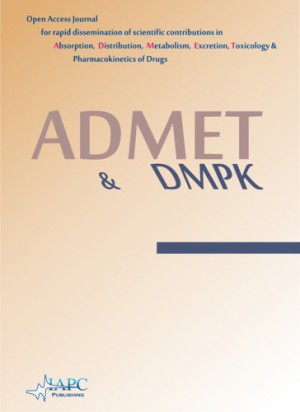
ADMET & DMPK
Yazarlar: Sachika Yamauchi, Daisuke Inoue, Kiyohiko Sugano
Konular:-
DOI:10.5599/admet.797
Anahtar Kelimeler:Artificial membrane,Permeability,Phospholipid,Tetracycline,Metal,Cation,Mucin
Özet: The bioavailability of tetracyclines is markedly decreased when co-administered with antacids, milk, or food containing Ca2+. Previously, it was suggested that the effective intestinal permeation of tetracycline (TC) was decreased due to Ca2+ linked mucin binding in the mucosal side. In the present study, we investigated the effect of Ca2+, Mg2+, and mucin on the membrane permeation of six tetracyclines (TC, oxytetracycline (OTC), minocycline (MINO), doxycycline (DOXY), demeclocycline (DMCTC), and chlortetracycline (CTC)). The membrane permeability values (Pe) of tetracyclines were measured by the parallel artificial membrane permeation assay (PAMPA) using soybean lecithin – decane (SL–PAMPA) and octanol (OCT–PAMPA) membranes. In SL–PAMPA, Ca2+ markedly decreased the Pe values of all tetracyclines. In OCT–PAMPA, Ca2+ increased the Pe values of TC, CTC, and DMCTC, but not DOXY, OTC, and MINO. Mg2+ decreased the Pe values of all tetracyclines in both SL–PAMPA and OCT–PAMPA (except for CTC in OCT–PAMPA). The addition of mucin had little or no effect in all cases. In contrast to the previously suggested mechanism, the results of the present study suggested that Ca2+ chelate formation decreased the membrane permeation of tetracyclines, irrespective of Ca2+ linked mucin binding. Molecular speciation analysis suggested that the permeation of TC – metal chelates was negligibly small in SL-PAMPA.
Dergi editörleri editör girişini kullanarak sisteme giriş yapabilirler. Editör girişi için tıklayınız.